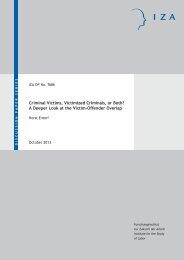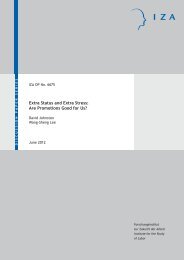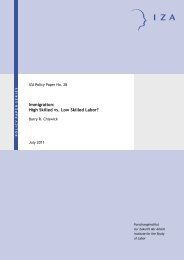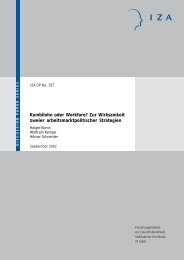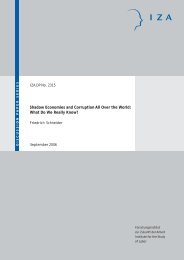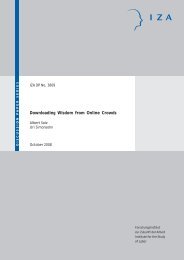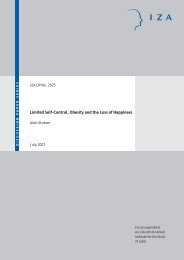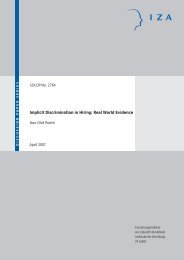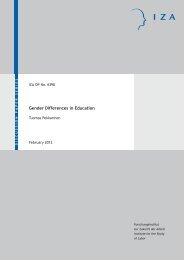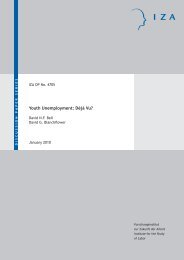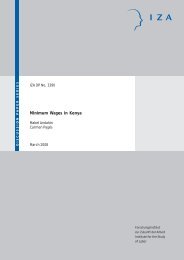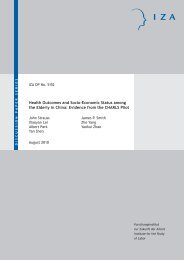The Great Recession of 2008-2009: Causes ... - Index of - IZA
The Great Recession of 2008-2009: Causes ... - Index of - IZA
The Great Recession of 2008-2009: Causes ... - Index of - IZA
- TAGS
- recession
- index
- ftp.iza.org
You also want an ePaper? Increase the reach of your titles
YUMPU automatically turns print PDFs into web optimized ePapers that Google loves.
Figure 1: Growing consumption in the US during the boom years despite stagnant real<br />
wages, 2000-2007<br />
Source: Bureau <strong>of</strong> Labour Statistics, www.bls.gov, and Bureau <strong>of</strong> Economic Administration, www.bea.gov.<br />
In addition to this phenomenon, during 2007 and the early part <strong>of</strong> <strong>2008</strong>, many developing<br />
countries were buffeted by food and energy price shocks that impaired the fiscal and current<br />
balances <strong>of</strong> the affected economies, led to food riots and protests in many countries and<br />
pushed millions into poverty. 14 This process was also an outcome <strong>of</strong> the global boom and the<br />
surging demand for goods in China, India and other fast-growing emerging economies. This<br />
situation was more pronounced for the non-oil or mineral exporters, but even within countries<br />
benefiting from the commodity bonanza, the poor were suffering from skyrocketing inflation<br />
without seeing much <strong>of</strong> the returns from the exports. <strong>The</strong> 2007-<strong>2008</strong> food and energy price<br />
shocks appears to have pushed more than 100 million people in the developing world into<br />
transient episodes <strong>of</strong> poverty. 15 In comparison, the World Bank estimates that the <strong>Great</strong><br />
<strong>Recession</strong> <strong>of</strong> <strong>2008</strong>-<strong>2009</strong> has resulted in an increase in poverty <strong>of</strong> 64 million people (by 2010)<br />
(World Bank 2010). <strong>The</strong> food and oil crisis was (and is), therefore, arguably a much greater<br />
14<br />
See World Bank/IMF (<strong>2009</strong>) Global Monitoring Report, Washington DC, p.1. As the report puts it: ‘For poor<br />
countries, this is a crisis upon crisis. It comes on the heels <strong>of</strong> the food and fuel crises. <strong>The</strong> triple jeopardy <strong>of</strong> the<br />
food, fuel, and financial crises is pushing many poor countries into a danger zone, imposing rising human costs<br />
and imperilling development prospects’. See also Islam, R and Buckley (<strong>2009</strong>).<br />
15<br />
See the statement <strong>of</strong> the World Bank’s President in April <strong>2008</strong>, http://go.worldbank.org/5W9U9WTJB0<br />
11



